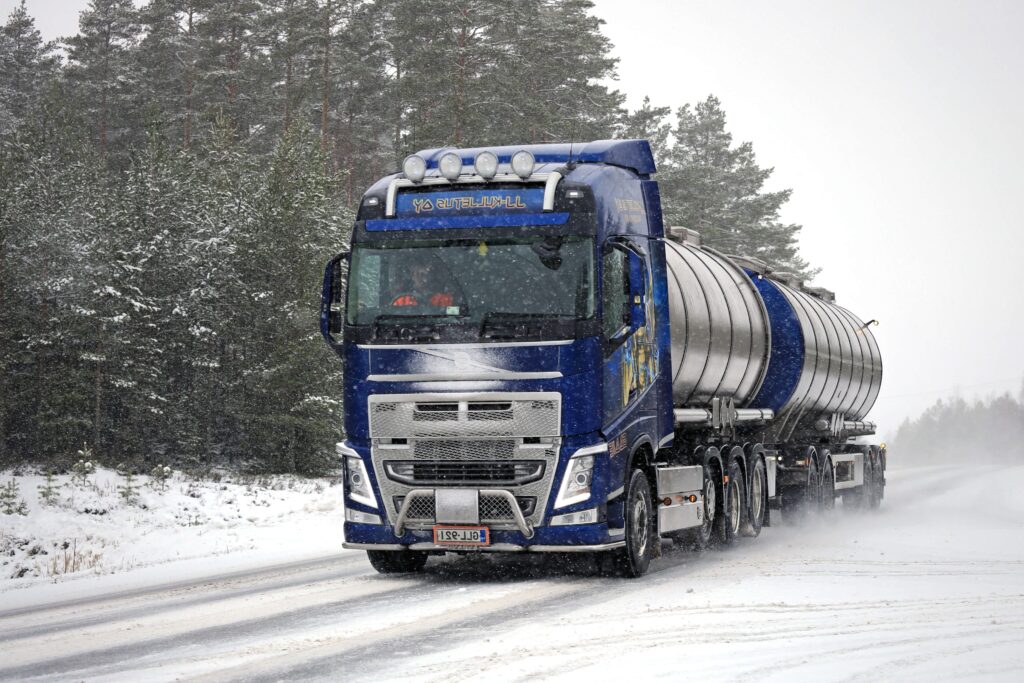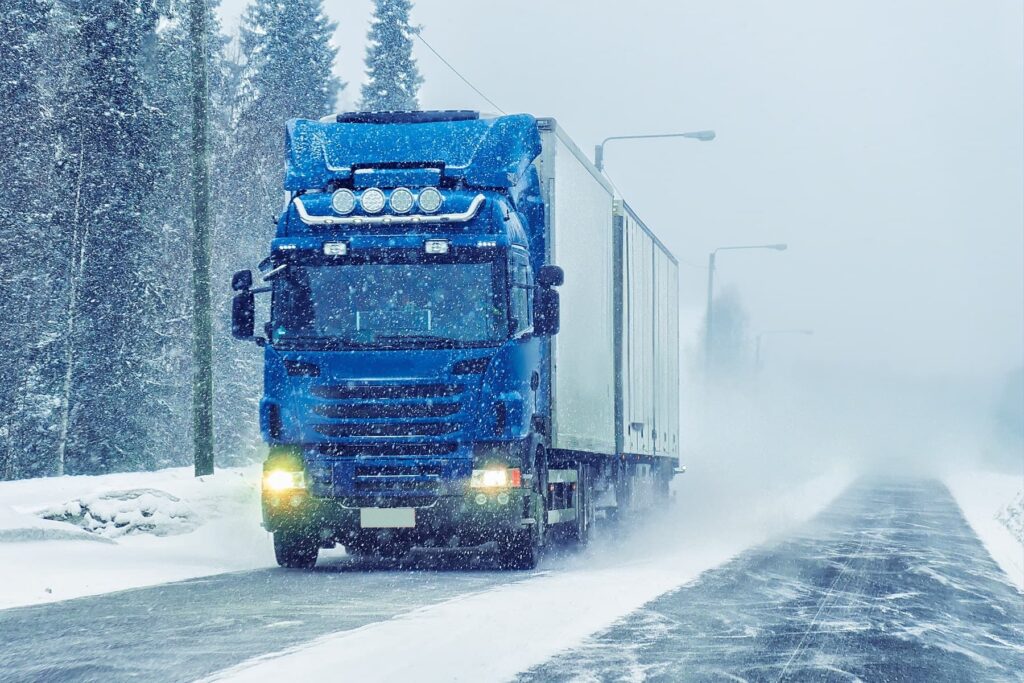Becoming an HGV driver can present a promising career path for individuals who have a strong interest in transportation and seek greater job flexibility. Not only does this profession offer lucrative earning potential in today’s competitive job market, but it also provides a dependable and adaptable role, enriched with chances to engage with diverse individuals and explore novel destinations.
Nevertheless, driving a Heavy Goods Vehicle (HGV) differs from operating a standard car. HGVs are substantial and intricate machines that demand specialised training to attain proficiency. You should at least have a HGV category C licence to operate an HGV. Moreover, particular seasons can introduce supplementary difficulties to your driving endeavours. Consider the summer, for instance, where remaining cool and maintaining concentration on the roads becomes paramount.
In order to successfully navigate the unpredictable winter season, it is crucial to anticipate various challenges such as malfunctioning heaters, black ice, and fog. Here are some essential tips to ensure safe driving during winter, enabling you to excel in your career as an HGV driver.
1. Keep up-to-date with a weather app

As an informed HGV driver, integrating technology into your profession can significantly enhance your experience. Whether it’s leveraging a user-friendly GPS system or utilising cutting-edge Bluetooth streaming tools to enjoy your favourite music while on the road, technology can truly revolutionise your life. Particularly During the winter season, it is advisable to tap into the technological advancements available to stay well-informed about weather conditions.
A weather application on your smartphone has the ability to notify you about various weather-related concerns, such as intense glare caused by the winter sun or heavy rainfall. Stay informed by utilising your weather app to monitor the following conditions:
– Snow and ice pose potential risks to your visibility and driving stability. When temperatures drop significantly, it is advisable to consider using tire chains or opt for roads that have already been treated with grit to mitigate these hazards.
During the winter months, the presence of Winter sun can provide a welcome respite from gloomy days. However, it is important to be mindful of the potential glare caused by the combination of sunlight and ice. To ensure your comfort and safety, it is advisable to have a pair of sunglasses readily available in case the need arises.
– Rainfall Intensity: Rainfall is a common occurrence for HGV drivers in the UK, but excessively heavy rain can pose challenges while driving. It is important to equip your vehicle with efficient windshield wipers and high-quality tires with good traction.
– Lightning and severe weather conditions pose a potential risk for skilled HGV drivers operating large vehicles. It is important to note that lightning tends to be attracted to sizeable metallic objects. It is advisable to consult your supervisor or manager to determine whether it is safe for you to drive through storms.
– Mist and fog pose significant challenges when it comes to visibility. If you find yourself on a misty road and cannot see a sufficient distance ahead, it is advisable to wait until the fog dissipates before proceeding further or consider taking an alternate route.
2. Regularly Check Your Vehicle

To ensure you are well-prepared for your driving session, it is necessary to check the weather forecast. Similarly, it is important to assess the current condition of your HGV vehicle. Many drivers already conduct these evaluations on a regular basis to ensure their truck is always safe, regardless of the season.
When the temperature begins to drop, it is advisable to create a list of items that should be checked before embarking on a journey. These points of consideration include:
Is the heating system functioning adequately to provide sufficient warmth?
– Are your tires properly balanced and in good condition to ensure your safety while driving?
– Windshield Wipers: Are you equipped with a reliable pair of windshield wipers to effectively handle rainy conditions?
– Battery: Is your battery in optimal condition, or does it require maintenance?
– Lighting: Is the functionality of your lights satisfactory? Are you able to effectively utilise your fog lights?
– Are the fluid levels adequate? Have you ensured that everything is filled up, including the fuel?
If you observe any possible issues with your vehicle during the winter season, it is advisable to have them rectified prior to embarking on any extended trips. The ultimate scenario you wish to avoid is experiencing a breakdown in freezing temperatures while being stranded in an isolated location.
3. Take a Survival Kit With You

Carrying a survival kit in your HGV may appear excessive if you have not faced any road-related problems before. Nevertheless, it can play a crucial role in ensuring your safety during the winter season. Certain companies may even provide these kits as a standard practice to assist their employees.
When it comes to preparing a survival kit for emergencies, there isn’t a single strategy that works for everyone. However, there are certain essential items that you should always have readily available. Basic necessities, such as a scraper and de-icer for your vehicle, extra blankets, and additional layers to keep warm, should be prioritised. It’s also important to include a shovel and a supply of salt or sand to assist with snow removal in case of heavy snowfall.
To enrich your toolkit, consider incorporating additional items.
An illuminating device or portable light source
– Jumper cables
– Additional food and water supplies
– A medical emergency kit
– Tyre chains
– Additional wiper fluid
– High-visibility clothing
A container that can keep drinks hot is known as a thermos.
Engage in a conversation with your supervisor and co-workers to gather their insights on essential items for a winter survival kit. This exchange will enable you to identify any overlooked necessities. While ideally, the kit won’t be necessary, being aware of its presence can provide a sense of security during unexpected situations.
Prioritise Your Safety

Experienced HGV drivers understand the utmost importance of prioritising safety at all times. Particularly During the winter season, it becomes crucial to exercise extra caution. It is not solely your driving skills that affect your safety on the roads during this time, but also the actions of other individuals. Here are some key measures to consider:
– When driving in wet, icy, or foggy conditions, it is important to reduce your speed. If your visibility is compromised, it is preferable to avoid sudden braking. Additionally, exercise extra caution when crossing bridges, as they are often not treated with grit.
– Create distance: It is crucial to maintain a safe distance between your vehicle and other drivers on the road. This precautionary measure significantly reduces the risk of encountering any difficulties if another driver begins to manoeuvre abruptly due to an icy section. Additionally, it is essential to remain vigilant for potential hazards during your journey.
Make sure to schedule regular breaks and listen to your body’s cues for rest. During winter, it is crucial to prioritise your health and focus, so taking breaks is essential. If you feel the need to pause and warm up during your journey, be sure to do so.
Informed individuals should also be aware of the appropriate time to cease driving and exercise caution during adverse weather conditions. If visibility of the road ahead is compromised, it is advisable to find a secure location to wait until the weather improves, rather than persisting with the journey. Prioritising personal safety should take precedence over punctuality, even if it means arriving at your destination later than planned.
Master the Art of Operating Heavy Good Vehicles
Despite the challenges that come with driving an HGV in winter, proper training will equip you with the necessary skills to handle any situation. When you choose to pursue a career as an HGV driver, you will receive comprehensive education that includes valuable advice on road safety throughout the year.

